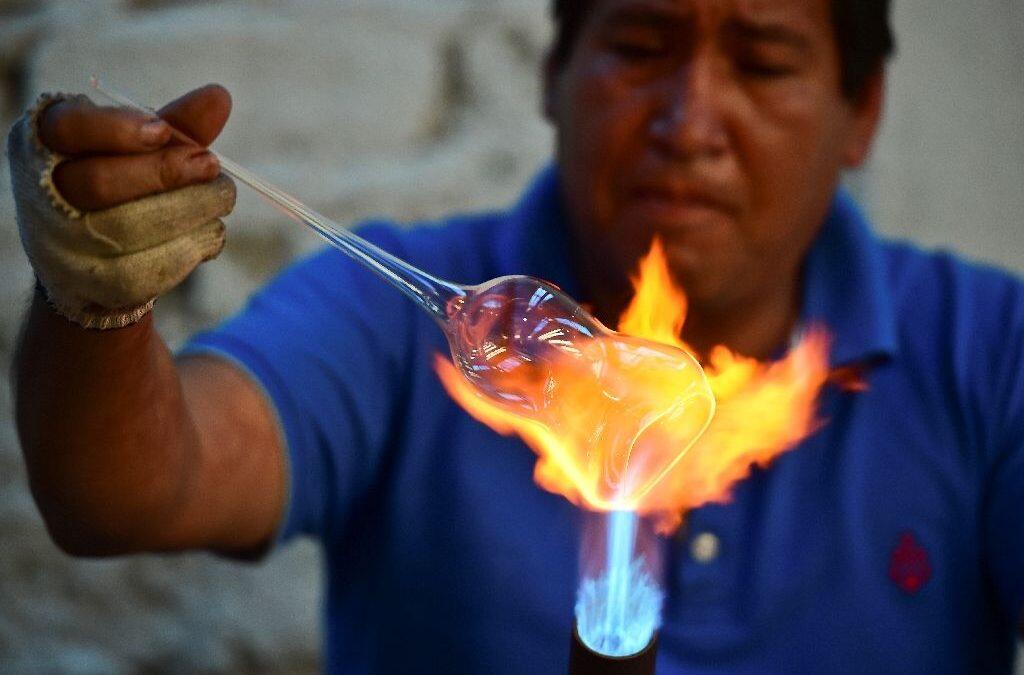Sweat runs down Adan Marin’s wrinkled face as he blows into a blob of molten glass, creating a perfect, delicate sphere within the blue and orange flames of his torch.
Marin is one of the godfathers of the glassblowing trade in the Mexican village of Tlalpujahua, which makes tens of millions of ornaments each year to decorate Christmas trees in American and Canadian homes.
Even mid-winter, the sun shines strong in this village in the western state of Michoacan. But it might as well be the North Poll.
Stores with names like “Santa’s Workshop” and “The Christmas House” line the colonial village’s cobblestone streets. And Christmas lasts all year for its 28,000 residents.
For more than 50 years, Tlalpujahua has been known as the Christmas ornament capital of Mexico, making blown-glass decorations that range from the traditional globes to sports team logos and Pokemon.
The booming cottage industry generated 1,000 jobs and $3.4 million in income last year for the village, which sold some 20 million ornaments, according to the local government.
This year, more than half a million tourists descended on the village for its annual ornament fair. The government expects 2016 sales revenues to top $4.5 million.
But there are also fears it could be the last boom year.
US President-elect Donald Trump’s vows to build a wall on the Mexican border and renegotiate the North American Free Trade Agreement are worrying Tlalpujahua’s glassblowers.
Trump, who takes office on January 20, has pledged to slap customs duty of up to 35 percent on goods from Mexico, a country that sends 80 percent of its exports to the US market.
“There’s a lot of concern,” said Rafael Berrios, the Tlalpujahua government spokesman.
If Trump follows through, the effect will be devastating for local artisans, he said.
Sick of Christmas
The village feels far removed from the rest of Michoacan, a state racked by violence and drug trafficking.
“It’s out of the ordinary for Michoacan,” said Luis Antonio Zimbron, a 43-year-old teacher from out of state who was in town ornament shopping.
“I had the opportunity to visit a similar place in Germany once, and it had nothing on Tlalpujahua,” he said, basking in “the decoration, the music, the magic.”
The magic has worn off for some residents, though, as you’ll learn if you ask them their favorite ornaments.
“We don’t have favorites, because we’re in Christmas mode all year here,” said Veronica Pompa, a manager at the village’s only mass-production ornament factory, Fimave.
“We almost don’t like Christmas anymore,” said Pompa, who has worked more than 40 of her 56 years in the industry.
Employees work nine-hour days in a smelly haze of lacquer, paint and polishing acid.
“We look at these models all year…. We even dream about ornaments,” said Pompa’s colleague of 25 years, Gaspar Velarde, as he washed a set of glass globes.
‘Keep blowing’
Still, blowing glass is a way of life for many in Tlalpujahua.
The tradition started in the 1960s when a large ornament factory set up shop in the village.
It promptly went out of business. But many villagers learned the glassblowing trade, and soon opened their own workshops.
Today there are more than 200 of them.
Marin started working at the original factory as a 15-year-old boy. Now 70, he still blows glass at the workshop he founded, which is run today by his children and grandchildren.
“I don’t know how to do anything else,” he said as he worked a ball of melted glass into a flower.
“It’s a job that takes a lot of patience,” added the master craftsman, who makes works of fragile beauty and reckons he has trained more than 300 people.
What are his plans for the future?
“To just keep blowing,” he said.
Source: AFP











